|
|
|
Sort Order |
|
|
|
Items / Page
|
|
|
|
|
|
|
| Srl | Item |
| 1 |
ID:
169333
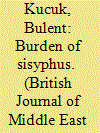

|
|
|
|
|
| Summary/Abstract |
ABSTRACT
This paper examines the contradictory transformation process the Kurdish movement has been experiencing over the last two decades and discusses its structural paradoxes and political shortcomings from a critical sociological perspective. Based on participant observation and interviews with activist researchers, the paper argues that the moral and ideological unity of the movement is challenged by ever-increasing social and mental divisions that are in turn prompted by forced displacement, rapid urbanization and diversified forms of social and symbolic inequalities within the Kurdish society. The fundamental division is between the emerging educated middle-class subjectivity, which has become the prime intellectual force leading the democratic political institutions, and the socially impoverished and radicalized urban youth, who have been active in contentious politics. This social division manifests within the dual organizational structures of the movement as twin and frequently contradictory dispositions. This schism also prevents the movement from building a much broader popular subjectivity to decolonize the social and political life.
|
|
|
|
|
|
|
|
|
|
|
|
|
|
|
|
| 2 |
ID:
125040


|
|
|
|
|
| Publication |
2013.
|
| Summary/Abstract |
Despite its relative absence from much of the literature on politics in the Pacific region, religiosity is an assumed and often unchallenged component of political life. Drawing from more than 100 in-depth biographical interviews with politicians, around 40 published life histories and other publicly available material, this article uses Pierre Bourdieu's concept of 'habitus' to explore how politicians see the role of faith and religious association contributing to their public profile, election campaigning, representative and legislative functions, and 'inner' life. It advances two arguments: firstly, that ideal analytic distinctions like state, society and religion become problematic in the Pacific Islands where political leaders tend to occupy multiple roles and assume overlapping identities; and, secondly, that despite the overwhelming religiosity seemingly apparent in public rhetoric, secularization is an effervescent narrative across the region with politicians vocal protagonists on all sides of this debate.
|
|
|
|
|
|
|
|
|
|
|
|
|
|
|
|
| 3 |
ID:
117436
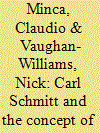

|
|
|
|
|
| Publication |
2012.
|
| Summary/Abstract |
The paper investigates the promise of Carl Schmitt's concept of 'nomos' for developing new spatial imaginaries apposite to the study of 'the border' in contemporary political life, as per the aims of the 'Lines in the Sand' research agenda. Schmitt introduced the idea of a 'nomos of the earth' to refer to the fundamental relation between space and political order. There have been various historical expressions of the nomos, from the Respublica Christiana, to the jus publicum Europaeum, to a post-World War II (dis)order yet to be adequately theorised. We aim to explore the relatively overlooked spatial ontology of Schmitt's work and suggest ways in which it might prompt alternative ways of thinking about borders and bordering practices as representative of broader dynamics in the relation between space and political order.
|
|
|
|
|
|
|
|
|
|
|
|
|
|
|
|
| 4 |
ID:
140073
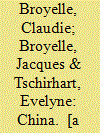

|
|
|
|
|
| Edition |
1st ed.
|
| Publication |
Sussex, Harvester Press Ltd., 1980.
|
| Description |
308p.hbk
|
| Standard Number |
0855275847
|
|
|
|
|
|
|
|
|
|
|
|
Copies: C:1/I:0,R:0,Q:0
Circulation
| Accession# | Call# | Current Location | Status | Policy | Location |
| 018851 | 951.050924/BRO 018851 | Main | On Shelf | General | |
|
|
|
|
| 5 |
ID:
027795
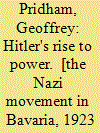

|
|
|
|
|
| Publication |
London, Hart-Davis, MacGibbon, 1973.
|
| Description |
xvi, 380p.hbk
|
| Standard Number |
0246105178
|
|
|
|
|
|
|
|
|
|
|
|
Copies: C:1/I:0,R:0,Q:0
Circulation
| Accession# | Call# | Current Location | Status | Policy | Location |
| 015565 | 943.085/PRI 015565 | Main | On Shelf | General | |
|
|
|
|
| 6 |
ID:
134125
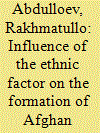

|
|
|
|
|
| Publication |
2014.
|
| Summary/Abstract |
The formation of a unified state in Afghanistan is deeply affected by the many ethnic contradictions that are greatly hindering its current development. They primarily relate to building a multiethnic state, the traditional domination of the Pashtun feudal elite in the power structures, the place and role of the non-Afghan peoples in the country's economic and political life, and the relations among the main ethnic groups that populate the country.
This article examines the sources of these ethnic problems as the centralized state completed its formation in Afghanistan and how they are expressed in the country's current historical mythology.
|
|
|
|
|
|
|
|
|
|
|
|
|
|
|
|
| 7 |
ID:
134124
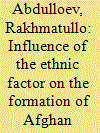

|
|
|
|
|
| Summary/Abstract |
The formation of a unified state in Afghanistan is deeply affected by the many ethnic contradictions that are greatly hindering its current development. They primarily relate to building a multiethnic state, the traditional domination of the Pashtun feudal elite in the power structures, the place and role of the non-Afghan peoples in the country's economic and political life, and the relations among the main ethnic groups that populate the country.
This article examines the sources of these ethnic problems as the centralized state completed its formation in Afghanistan and how they are expressed in the country's current historical mythology.
|
|
|
|
|
|
|
|
|
|
|
|
|
|
|
|
| 8 |
ID:
118171
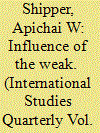

|
|
|
|
|
| Publication |
2012.
|
| Summary/Abstract |
Political life in modern Japan, South Korea, and Taiwan is commonly characterized by a strong central government, influential economic elites, and a relatively homogeneous society. In such settings, we would not expect to find much impact by foreigners and small NGO actors on policy changes, but the cases in these countries challenge this assessment. Relatively unskilled foreign workers in present-day Northeast Asia face a range of hardships, and existing government programs have provided little support until recently. Media portrayals of foreign workers-as in several other industrialized democracies-reinforce popular suspicions and fear of these foreigners. Yet, citizens of host countries themselves have formed numerous voluntary associations aimed at assisting foreign workers. I call the activities of these groups "associative activism." My account of associative activism makes explicit the process through which some activists, who initially work in concert chiefly to solve specific problems, eventually form broader political ambitions as they exert pressure on dominant features of the public sphere, especially processes of governance, political representation, and opinion formation. I identify three domains of associative activism through which political influence is exerted by immigrant rights groups: legislative, juridical, and municipal. These efforts illustrate how civil society groups can play an increasing role in protecting foreigners' rights and advancing democratization in Northeast Asia.
|
|
|
|
|
|
|
|
|
|
|
|
|
|
|
|
| 9 |
ID:
133299
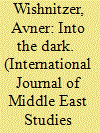

|
|
|
|
|
| Publication |
2014.
|
| Summary/Abstract |
This article analyzes different traditions of nocturnal conviviality in 18th-century Istanbul and demonstrates their importance for social, political, and cultural life. The main argument is that the palace used the night to demonstrate its power in spectacles of light and to cultivate personal relations within the elite, both of which were crucial for a patrimonial government based on face-to-face interaction. Yet, it was exactly the reliance on such interaction that marked the limits of the palace's hold of the night. With the neighborhood gaze blinded by darkness, communal policing lost much of its effectiveness, leaving nocturnal social life largely concealed from the eyes of the authorities. Nighttime therefore offered opportunities for illicit modes of socialization and, at times, for subversive political action.
|
|
|
|
|
|
|
|
|
|
|
|
|
|
|
|
| 10 |
ID:
123393
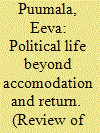

|
|
|
|
|
| Publication |
2013.
|
| Summary/Abstract |
This article explores political agency in the interstices of the bodily politics of asylum. It shows how its practices make bodily surfaces and how alternative forms of political authority emanate from bodies. Relying on Jean-Luc Nancy's ontology of the body, it examines forms of political agency that are enacted by people often considered as abjective subjectivities in the spaces of the international. Deriving from interviews conducted with failed asylum seekers, the article sheds light on agencies and resistances embedded in and extant despite the governmental efforts to solve the problem of the moving body. Ethnographic data and interviews with the failed asylum seekers show how they take control over their lives, not as separate, sovereign subjects, but in relation to their political surroundings and others. In a way, the failed asylum seekers produce and practice their own politics that both takes part in and exceeds the limits set by sovereign politics. By exploring political agency from underneath and beyond sovereign power and governmentality, the article presents a reading of the intertwining of the international, political, and bodily.
|
|
|
|
|
|
|
|
|
|
|
|
|
|
|
|
| 11 |
ID:
126045
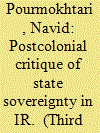

|
|
|
|
|
| Publication |
2013.
|
| Summary/Abstract |
This paper presents a postcolonial critique of state sovereignty as it is understood in ir. It is argued that the colonial relation between Orient and Occident has informed the development and practice of sovereignty. The Orient has been on the losing end of this relationship, as its experiences, trajectories and sociocultural and political life have been reduced to a set of homogeneous deficiencies. The result has been to consign it to a zone of 'Otherness', wherein sovereignty has become synonymous with inferiority and difference vis-à-vis the Occident. In demonstrating that ir has been dominated by a Western intellectual tradition that privileges the concept of sovereignty, I will critically question the epistemological privileging of the West, and in particular of Europe, as a source of knowledge regarding state sovereignty and interrogate how the East-West dichotomies-eg civilised-uncivilised, modern-traditional, democratic-undemocratic-that underpin ir studies make the practice of sovereignty a 'conditional' virtue for non-Western states, in both theory and practice.
|
|
|
|
|
|
|
|
|
|
|
|
|
|
|
|
| 12 |
ID:
131015
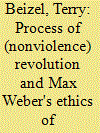

|
|
|
|
|
| Publication |
2014.
|
| Summary/Abstract |
Weber dismissed paci?sm as an inadequate orientation to modern social and political life. However, the ethical and methodological imperative of Gandhi's insistence on active nonviolence contention is illuminated by and consistent with Max Weber's "ethic of responsibility"-marked by both passion and proportion-in the relationship between motivations, means, and ends in social action. Therefore, Weber's insights add clarity Gandhi's nonviolent ethics and methods; Gandhi's nonviolent ethics and methods add clarity to Weber's understanding of responsibility in modern political and social life. This provides a key to understanding active nonviolence and building the (peaceful) future in the process of revolution.
|
|
|
|
|
|
|
|
|
|
|
|
|
|
|
|
| 13 |
ID:
132008
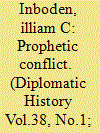

|
|
|
|
|
| Publication |
2014.
|
| Summary/Abstract |
This article traces the development of Reinhold Niebuhr's growing alarm over the rise of Nazi Germany and Imperial Japan leading up to World War II, and his corresponding warnings to the United States and allied powers of the need to confront fascist aggression. The theme of the "prophetic" shaped Niebuhr's perception of the threat of fascism, both through his concern over the religious liberty of Christian and Jewish voices to bring prophetic judgments against totalitarian governments and through his predictions of the threat that fascist regimes posed to the international order. In the course of the 1930s Niebuhr also refined his doctrine of Christian realism, which both influenced yet differed from the evolution of realism as a theory of international relations. Niebuhr's development over this decade also marked his transition from the margins to the center of American intellectual and political life.
|
|
|
|
|
|
|
|
|
|
|
|
|
|
|
|
| 14 |
ID:
166857
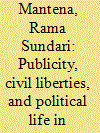

|
|
|
|
|
| Summary/Abstract |
In the 1930s, there were two glaring questions confronting the princely state of Hyderabad's Administration: the question of sovereignty (or the political future of the Hyderabad) and the problem of civil liberties. This article explores the complex socio-political conditions in the early decades of the twentieth century that gave rise to the formation of dynamic civil-society institutions in the princely state of Hyderabad. In particular, it asks how and why the discourse of civil liberties was taken up by these institutions and assesses the response of the Hyderabad Administration with respect to safeguarding civil liberties for its subjects. What the historical record reveals is that the early decades of the twentieth century in Hyderabad became a battleground between the Hyderabad Administration and the burgeoning public sphere that the Administration could not control nor manage.
|
|
|
|
|
|
|
|
|
|
|
|
|
|
|
|
| 15 |
ID:
143144
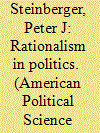

|
|
|
|
|
| Summary/Abstract |
Much recent political thought has been devoted to the proposition that neither political endeavor properly understood nor theorizing about such endeavor is or could ever be a kind of rational activity. I examine three broad approaches that celebrate, respectively, rhetorical practices of political persuasion, agonistic conceptions of democracy, and, more generally, a kind of hard-headed critical realism rooted in the plain facts of political life. I argue that criticisms of rationalism in politics associated with these approaches systematically ignore central tenets of what might be called a post-Kantian convergence of recent and important philosophical perspectives and that such perspectives can be enormously useful in addressing and critically evaluating the underlying intellectual structures of political life.
|
|
|
|
|
|
|
|
|
|
|
|
|
|
|
|
| 16 |
ID:
130033
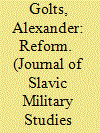

|
|
|
|
|
| Publication |
2014.
|
| Summary/Abstract |
Two years ago president Dmitry Medvedev and Minister Anatoly Serdyukov stated that military reforms are 'practically' complete. It looks premature now. Serdyukov managed to fulfill only 'quantitative' part of reforms. The 'Serdyukov' reforms will follow the path typical of the majority of Russian reforms. They focus on meeting certain formal measures and characteristics (in the case of military reform, this includes the size of the armed forces, the number of units, the new structure and so on) and, at the same time, avoid making decisions that would require radical changes in the country's political and social life.
|
|
|
|
|
|
|
|
|
|
|
|
|
|
|
|
| 17 |
ID:
128167
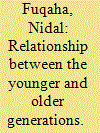

|
|
|
|
|
| Publication |
2012.
|
| Summary/Abstract |
Through education, training and collective action, youth can bring about change in the political structure - but it must come from the youth themselves.
|
|
|
|
|
|
|
|
|
|
|
|
|
|
|
|
| 18 |
ID:
127804
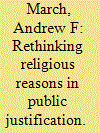

|
|
|
|
|
| Publication |
2013.
|
| Summary/Abstract |
This article intervenes in the debate on the place of religious arguments in public reason. I advance the debate not by asking whether something called "religious reasons" ought to be invoked in the justification of coercive laws, but by creating a typology of (a) different kinds and forms of religious arguments and, more importantly, (b) different areas of political and social life which coercive laws regulate or about which human political communities deliberate. Religious arguments are of many different kinds, are offered to others in a variety of ways, and the spheres of life about which communities deliberate pose distinct moral questions. Turning back to the public reason debate, I argue then that political liberals ought to be concerned primarily about the invocation of a certain subset of religious reasons in a certain subset of areas of human activity, but also that inclusivist arguments on behalf of religious contributions to public deliberation fail to justify the use of religious arguments in all areas of public deliberation.
|
|
|
|
|
|
|
|
|
|
|
|
|
|
|
|
| 19 |
ID:
109487
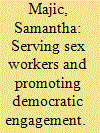

|
|
|
|
|
| Publication |
2011.
|
| Summary/Abstract |
In debates about promoting civic and political engagement in America, political scientists are often skeptical about the role of nonprofit organizations offering health and social services in the US because they are constrained by the tax code and grant agreements. However, I argue that by focusing on what I term social movement-borne nonprofits, we can see how these organizations may engage (marginalized) communities and participate in political activities. To illustrate, I consider the California Prostitutes Education Project (CAL-PEP) and the St. James Infirmary (SJI), two San Francisco Bay-area nonprofits created by prostitute-rights activists that offer HIV/AIDS and other health services to sex workers. Drawing on multi-method qualitative research on CAL-PEP and the SJI, I argue that social movement-borne nonprofits engage in political activities through a process of radical institutionalization, whereby they incorporate and advance activist goals within their organizational practices. I theorize the properties of radical institutionalization as "oppositional implementation," "community engagement," and "claims-making activities." My hope is that scholars will test for and further define these properties in order to broaden understandings of nonprofits' evolving role in civic and political life, and in processes of social change.
|
|
|
|
|
|
|
|
|
|
|
|
|
|
|
|
| 20 |
ID:
084470
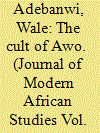

|
|
|
|
|
| Publication |
2008.
|
| Summary/Abstract |
This essay examines the 'posthumous career' of Chief Obafemi Awolowo, the late leader of the Yoruba of Nigeria. It focuses on why he has been unusually effective as a symbol in the politics of Yorubaland and Nigeria. Regarding Awolowo as a recent ancestor, the essay elaborates why death, burial and statue are useful in the analysis of the social history of, and elite politics in, Africa. The Awolowo case is used to contest secularist and modernist assumptions about 'modernity' and 'rationality' in a contemporary African society.
|
|
|
|
|
|
|
|
|
|
|
|
|
|
|
|
|
|
|
|
|